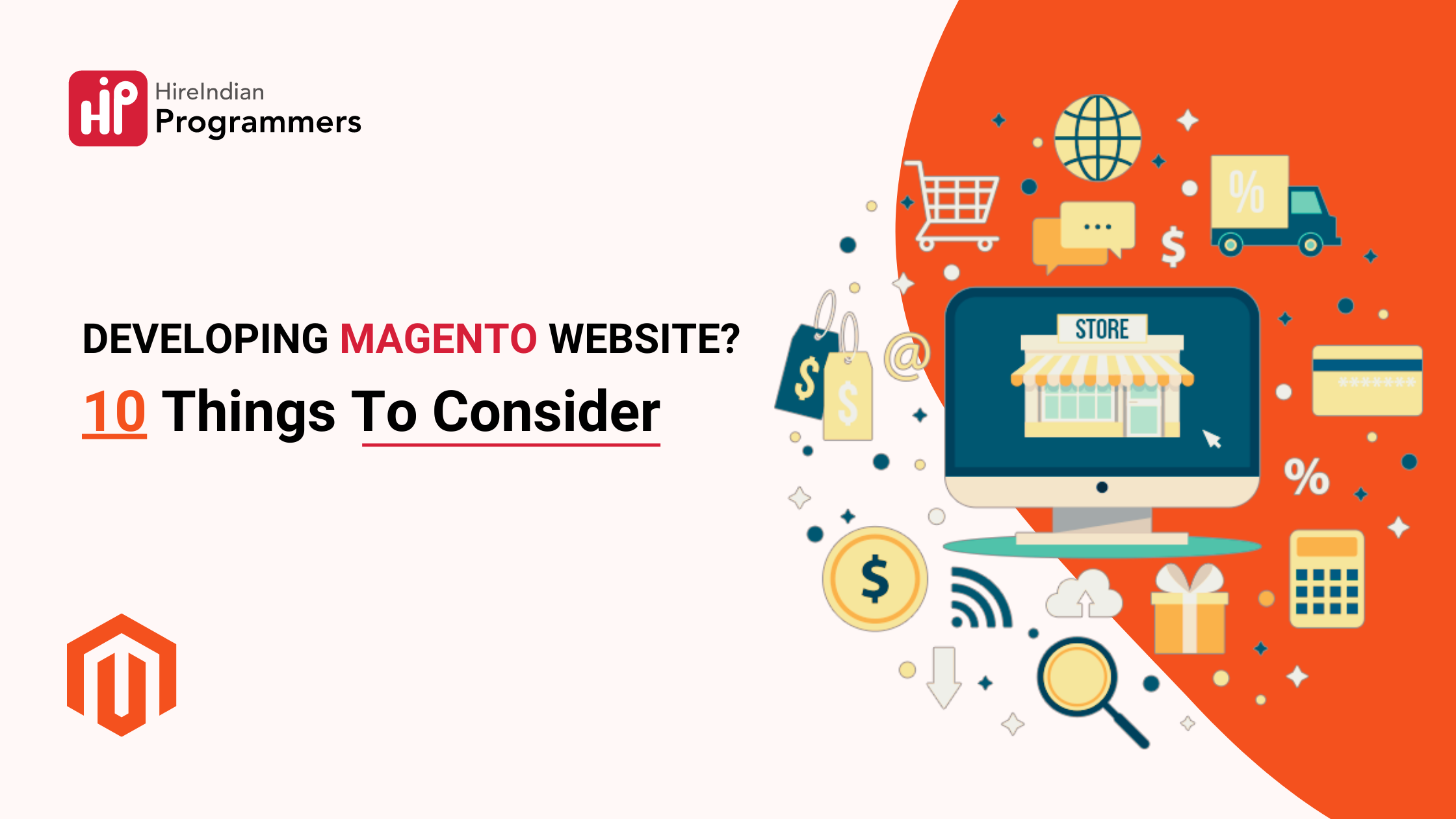Out of all the eCommerce platforms available, Magento is one of the most popular. It offers a lot of customization, support, and powerful functionality. It is well-known for its flexibility and freedom.
However, nuances and intricacies come with every large platform, often complicating development if you don’t have the right team or experience. It’s the same case with Magento websites.
In this article, we’ll discuss some essential things you should know about Magento websites that will allow you to successfully grow and manage your e-store.
Understanding Magento editions
Magento is a powerful eCommerce platform with two editions: Community and Enterprise. Anyone can use both versions to run an online store, but the Enterprise edition has more features and functionality than the Community edition.
The Magento Community Edition is free to download and use. It’s built on an open-source framework that allows developers to customize it to meet their needs. This flexibility makes it popular among small businesses, but it also lacks some features in the enterprise version.
The Magento Enterprise Edition is available through a subscription, including updates and support from Magento’s engineering team. It has all the capabilities of the Community Edition plus some additional features, such as multi-store management, advanced order management, and CRM integration.
10 things you should know before developing a website on Magento
1. Website development costs
Depending on your business goals and objectives, you’ll want to consider whether Magento Enterprise Edition or Magento Community is right for you. Magento Enterprise Edition starts at $22,000 annually and comes with advanced features, security updates, exclusive product enhancements, and more.
Magento Community is a free version of the software, but with Chetu-certified Magento developers, you can transform the platform to have all the industry-specific features your store requires.
If you want to develop your own Magento website, here are some developer costs to consider:
Freelancer
The average cost of hiring a freelancer is about $500-$1000 per month. The cost depends on the level of expertise required for the project.
A freelancer costs less as they’re working on several projects simultaneously.
In-house team
The average cost of hiring an in-house Magento developer can range from $50-$250 per hour.
As you can see, the cost of hiring an in-house team is much higher than using a freelancer. The reason is that if you hire an in-house team, they will need to learn how to use the tools and technologies required for Magento development. Also, it isn’t easy to handle an in-house team as you’re required to oversee the progress.
Magento development agency
The average cost of hiring an agency for Magento development ranges between $750 and $5000 per month, depending on your requirements.
It’s better to go with a Magento development agency as they’re responsible for your website from the concept stage to completion. They provide you with full support and maintenance after launching your website.
2. Server requirements
The server requirements for a Magento website vary depending on the size and complexity of your store. However, there are some basic guidelines that you should follow to ensure that your store runs smoothly:
- Linux x86-64 operating system
- No support for Mac and windows
- Required web servers: Apache 2.4, Nginx 1.x
- 2 GB RAM requirement
- Database: MySQL 5.6, MySQL 5.7
- PHP: PHP 7.1.3, PHP 7.2.0, PHP 7.3.0
- PHP OPcache enabled
- SSL enabled for HTTPS
- Mail server: SMTP or MTA
3. Get A Strong Hosting Plan
Your website is your most valuable asset. It can determine your success or failure. So, you must ensure that you have a solid hosting plan in place so that your website runs smoothly.
Choose the right web host for your Magento eCommerce store and you can get a robust hosting plan. A good web host will provide you with the following:
Reliability
You want the site to be up and running so customers can view and buy its products. It’s important to cut the downtime of your site to ensure that your customers have a smooth purchasing experience.
Performance
Your website must perform well on any device or browser a customer may use when accessing your site. This includes smartphones, tablets, laptops, desktops, and more. A good web host will ensure that performance remains high, so customers have a good experience browsing through your catalogues and shopping carts.
Security
You don’t want hackers breaking into your server and stealing data or corrupting files on the server because this could cause serious security problems for both you and your customers who rely on those files being available for use online.
4. Everything happens in the backend
When developing a new eCommerce website, most people first consider the front end. The truth is that everything happens in the backend.
So, what does “backend” mean? In simple terms, this is the part of your website that does not show up as content on your website. The code and programming power your site and make it work.
It’s important to develop an amazing frontend experience. But, unless you have an efficient backend system, it will be impossible for your customers to get what they want from your site.
Magento provides a wide range of features and services that you can customize to create a powerful backend system that suits your needs.
5. Magento developers can make your website more accessible
Magento development is a complex process. It requires good knowledge of the platform and an understanding of eCommerce and its features.
The developers can help you set up your store so that it is easy for customers to browse through your products and make purchases without any problems. In addition to the many advantages of hiring Magento developers, they can improve your site’s security so that it is not vulnerable to attacks from hackers or other malicious third parties.
HIP can help you find a good Magento Developer with ease. We have a team of skilled Magento developers who are experts in their field and can deliver the best results within your budget.
6. Optimize the site for search engines
The most important thing is to ensure your website is search engine friendly. The website will rank well in search engines such as Google, Yahoo, and Bing. If people cannot find your website through these search engines, they will never visit your site, which means no business for you.
Magento’s SEO tools can easily optimize your site content to achieve higher search engine rankings. These features include:
- Meta tags for products and catalogue pages
- SEO-friendly URLs for products and categories
- Meta tags for the home page
- Images optimization
- HTML and XML sitemaps
- Robots.txt and meta robots
- Canonical tags
- Rich snippets
- Google Analytics and Google AdWords integrations
- Improved layered navigation optimization
7. Test, test and test again
After installing Magento, you should familiarise yourself with the software and its features. A great way to do this is by playing around with the demo data or installing a blank store and setting up dummy products and categories.
Once you’re familiar with how things work, it’s time for some real-world testing: Load up your store in your browser, find something that works, and then try loading a page that doesn’t work properly (or at all).
8. Speed is its key point
The speed of your website is a major factor in ensuring a good user experience for your visitors. It’s not just about how fast your pages load but also how quickly you can get a response from the server and return the results to the user.
Magento 2 is built with performance in mind. It’s also faster than other eCommerce platforms because it uses PHP 7 and MySQL 5.7 by default. According to Kinsta, 79.4% of websites use PHP to some degree, making Magento 2 more compatible with most websites out there than other platforms like Shopify or WooCommerce, which use different languages like Ruby on Rails or NodeJS, respectively.
9. Know about the important Magento extensions
Magento has thousands of extensions available for free or paid downloads. These third-party tools can be integrated into websites to enhance their functionality. Extensions can add new features and functionalities to your site, improve performance, and create more sales opportunities.
Free extensions can be downloaded from the official website, but they have some limitations in functionality compared to paid versions. Paid extensions are more feature-rich than free ones but also cost more money (some can cost hundreds of dollars).
10. The learning curve for Magento
Magento has its own development community and many resources available for new developers to learn how to use it.
But Magento isn’t for everyone. It does have a steep learning curve that might scare off some beginners. If you’re not comfortable with code or aren’t willing to put in the time and effort to learn it, then you can hire a team to build the e-commerce store for you.
If you want an e-commerce platform that has excellent scalability and extensibility, then Magento is the one you need.
Get high-quality Magento developers for your next project
With the increasing popularity of eCommerce websites and the need for them to be more responsive and user-friendly, Magento has become the most popular platform for building such websites. For this reason, you must find a developer who understands Magento and can provide quality work.
HIP is a leading Magento development agency with a dedicated team for designing and developing websites on the platform. We can help you hire a team of dedicated Magento developers to build Magento sites that meet your needs while remaining scalable as your business grows.
FAQs
1. What are the skills required for a Magento developer?
A Magento developer is required to have good knowledge of PHP and Magento development. A developer should also know about MySQL database management and the ability to write clean code.
2. Is Magento beginner friendly?
Magento is a complex system with many features and options. There are many different versions of Magento that can be confusing to navigate.
3. What is the difference between Magento and WordPress?
Magento is an eCommerce platform that enables businesses to build, manage, and grow their online store. On the other hand, WordPress is a content management system (CMS) which powers many websites.
Related Magento Blogs:
- Top 10 Magento Product Designer Tools To Know About
- 16 Questions to Ask Before Hiring Magento Developers
- Why to Migrate Your Current Ecommerce Store to Magento 2?

